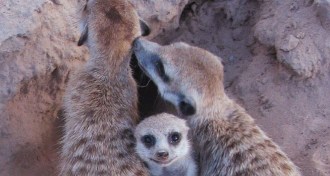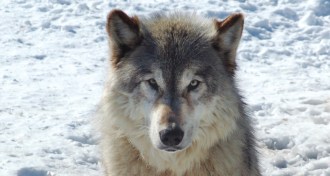Search Results for: Wolves
Skip to resultsCan’t find what you’re looking for? Visit our FAQ page.
408 results for: Wolves
-
 Life
LifeEvolution of mammalian monogamy remains mysterious
Two large studies reach opposing conclusions about why males stay with females.
-
 Humans
HumansFrom the August 30, 1930, issue
alt=”Click to view larger image”> IN COTTON CLOTHING Wolves in the clothing of sheep have been familiar, at least as metaphors, for a couple of millennia. More lately, since we have begun to pay close attention to our trees and shrubs, have we become acquainted with a tiny wolf disguised as a tiny tuft of […]
By Science News -

-
 Animals
AnimalsYear in Review: Canine genealogy
Competing clues confuse the story of dog domestication.
By Meghan Rosen -

-

-

-
 Life
LifeMere fear shrinks bird families
Just hearing recordings of predators, in the absence of any real danger, caused sparrows to raise fewer babies.
By Susan Milius -
 Life
LifeCarnivores can lose sweet genes
A gene involved in taste detection has glitches in some, but not all, highly carnivorous mammals.
By Susan Milius -
 Paleontology
PaleontologyMeet the old wolves, same as the new wolves
The dire wolf, an extinct species preserved in abundance at the La Brea tar pits, seems to have had a social structure similar to that of its modern-day relatives.
By Sid Perkins -
 Life
LifeGenetic sameness could be factor in Tasmanian tiger extinction
The first complete mitochondrial genome of the Tasmanian tiger is revealed. Analysis shows little genetic diversity.
-
 Genetics
GeneticsDog gene heeds call of the wild
Domesticated dogs passed a gene for dark fur color to their wild cousins.